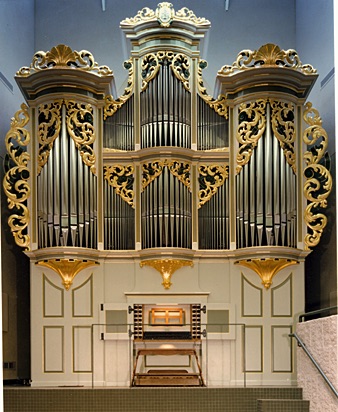James Kibbie
The Complete Organ Works of J.S. Bach
ABOUT THE BACH CONCERT SERIES
by James Kibbie
This series presents the complete extant organ works of Johann Sebastian Bach in eighteen concerts. The first seventeen use a unique resource, the C.B. Fisk organ in Blanche Anderson Moore Hall at the University of Michigan. This instrument is modelled on the 18th-century German organs of Gottfried Silbermann, one of Bach's favorite organbuilders, and is named in honor of my late colleague Marilyn Mason. The final concert will be on the iconic Frieze Memorial Organ in Hill Auditorium.
These concerts offer an opportunity to contribute to the James Kibbie Scholarship, which was established in 2000 to support organ and sacred music students at the University of Michigan. The greatest joy of my 42 years on the Michigan faculty has been working with our extraordinary students. They inspire me daily. Through the generosity of our scholarship donors, we will continue to bring the world's finest organists to Michigan.
The canon of Bach organ works is growing in the 21st century. When I played the complete organ works of Bach in eighteen recitals at the University of Michigan in 2000, the series included 266 works. When I recorded the complete works about ten years later on original baroque organs in Germany, the number had grown to 274. With the addition of works that have been recently discovered or authenticated, this current series includes 281 works, totaling over 18 1/2 hours of performance time.
Exactly which works should I perform? More than 270 years after Bach's death, it is by no means certain exactly what he composed. The selection of works for this series draws on the forthcoming revision of the Bach Werke Verzeichnis (Bach Works Catalog), supplemented by other recent scholarship including research by Christoph Wolff, George Stauffer, and my own Bach coach Peter Williams. Bach's organ transcriptions of works by other composers have been included. I'm also performing those works that survive only as fragments, leaving them incomplete as they exist in the manuscript sources.
Several works once thought to be by Bach have now been identified as spurious, and so have not been programmed on this series (for example, the Eight “Little” Preludes and Fugues). Even guided by the best current scholarship, I was left with a handful of pieces that might or might not be by J. S. Bach. I have made my personal choices as to which of these to play, including especially those long associated with the Bach canon, such as the Pedal-Exercitium and the Kleines harmonisches Labyrinth. Ultimately, though, my programming represents only a snapshot of current Bach research. No doubt future performers of the complete works will make some different choices.
I have tried to construct eighteen “audience-friendly” programs, each planned as a complete unit, so that someone attending just one or two concerts will still experience the rich variety of Bach's genius. Except for Program 4 (the great pedaliter settings of Clavierübung, Volume III), each program follows a similar plan, beginning and ending with a free work (for example, a prelude and fugue, fantasia or concerto) and featuring several contrasting groups of chorale-based pieces separated by one or more additional free works.
It is an honor to play this magnificent music. I hope you will enjoy the performances. Soli Deo gloria.
James Kibbie
